This guide is about Podcast Recording Software Comparison for Startup Founders today. We’ll look at pricing, features, and what each tool does best so you can make the smart choice for your time, budget, and goals.
Some of the most well-known founder journeys didn’t start with big teams or huge budgets. They started with a microphone and a clear message.
Harry Stebbings launched The Twenty Minute VC alone in his bedroom at 18. Within two years, he was interviewing top investors and founders. That podcast helped him build his network and eventually raise over $400 million for his own venture capital firm.
Steven Bartlett began Diary of a CEO at his kitchen table during downtime. Today, it’s one of the most popular business podcasts in the world, bringing in millions of listeners and millions in revenue.
What made their podcasts work wasn’t just great content. It was the consistency, the sound quality, and how easy it was to keep going. All of that depends on the recording software you choose.
If you’re considering launching a podcast for your startup, picking the right tool is one of the most important decisions you’ll make early on. The good news? You don’t need a studio or a sound engineer to get started, just the right tools.
Let’s get started.
1. Audacity – Free | Windows/Mac/Linux
This is best for bootstrapped startups, technical founders, early experimentation.
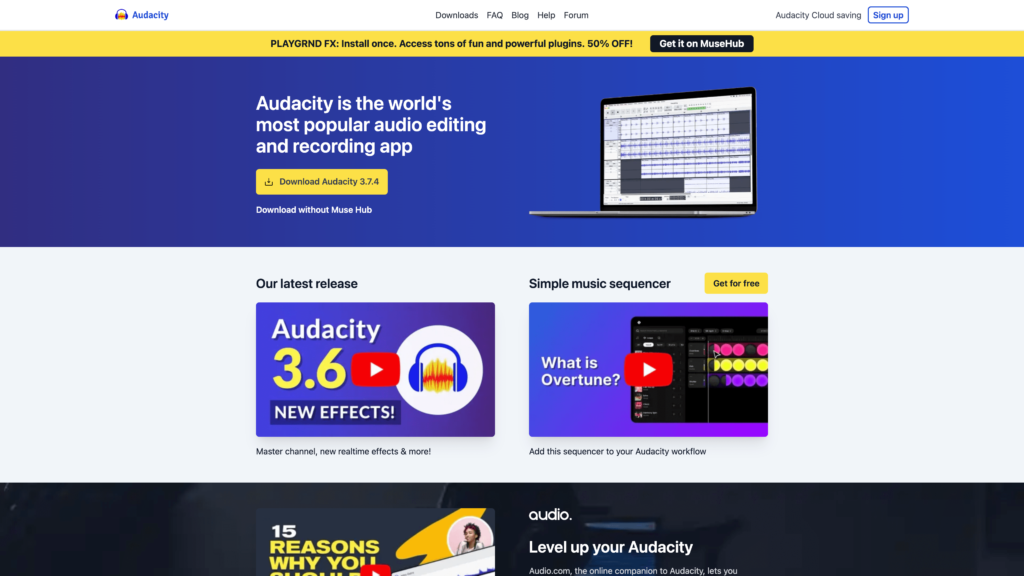
Audacity has been around since 2000, and while it’s not the sleekest interface, it’s surprisingly powerful. You’ll get multi-track editing, noise reduction, effects, and full control over your audio. But there’s a catch: everything is manual.
If you’re willing to watch a few YouTube tutorials and don’t mind the DIY vibe, this is a strong no-cost option. Just know that there’s no built-in remote recording or cloud sync, it’s strictly local.
What founders won’t find on the homepage:
- No AI-powered cleanup or filler-word removal: The software doesn’t have smart tools to automatically delete “ums,” “likes,” or awkward pauses. If you want a polished episode, you’ll need to manually edit everything or hire someone to do it. This slows down production, especially if you’re aiming for consistency or repurposing clips quickly.
- No real-time collaboration tools: You can’t invite your editor, assistant, or co-founder to help during a recording session. Everyone has to work separately, which makes it harder to coordinate, catch mistakes live, or manage guests in real time. This is especially inconvenient for busy teams or solo founders juggling multiple roles.
- Not ideal for guests unless you use a separate remote recording tool like Zoom or OBS: If you’re interviewing guests remotely, this tool alone won’t cut it. You’ll need to record the conversation using Zoom or another remote platform, then import that file into this software to edit it. That adds extra steps, complexity, and risk of lower audio quality, something founders with tight schedules will want to avoid.
2.GarageBand – Free (Mac only)
This is best for solo founders using Apple products, early-stage content experiments
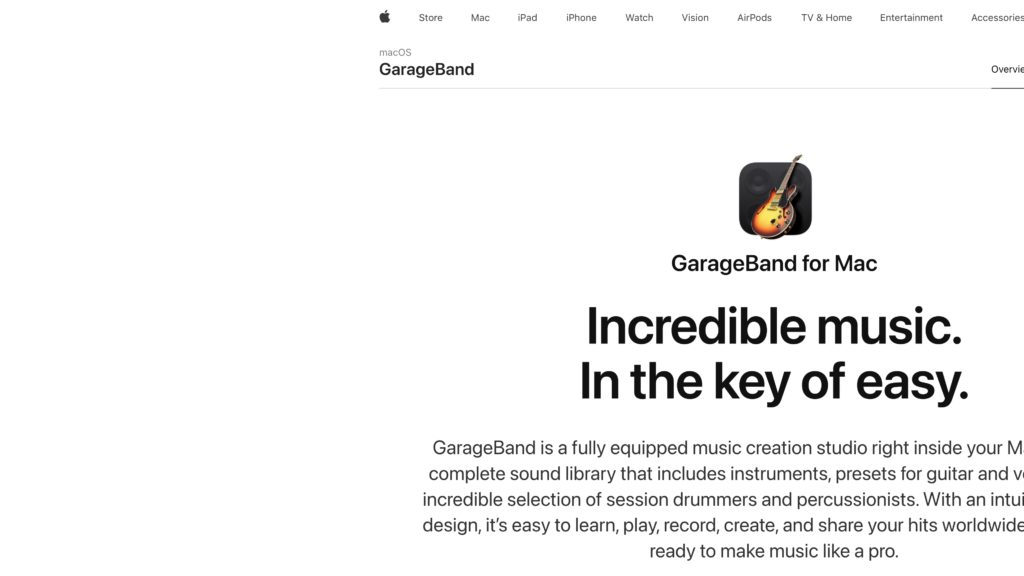
GarageBand is often overlooked in favor of more professional tools, but for Mac users, it offers a lot, especially if you’re recording solo or basic interviews. It’s not designed for podcasts per se, but it’s intuitive, clean, and works beautifully on Apple’s ecosystem.
Hidden strength: It’s tightly integrated with Logic Pro (Apple’s professional DAW), so if you grow out of GarageBand, you can scale up without switching platforms.
Limitations to note:
- No native remote recording features: You can’t use GarageBand to record a conversation with someone who’s not in the same room. If you’re doing remote interviews (like most founders do), you’ll need to record the call separately (using Zoom, Riverside, etc.) and then import the audio into GarageBand to edit.
- Requires decent headphones/mic setup to avoid internal noise: GarageBand picks up a lot of background noise if you’re using built-in laptop mics or regular earbuds. You’ll need a proper microphone and headphones to get clean, professional sound; otherwise, your podcast may sound echoey or amateur.
- No automated transcription or editing shortcuts: There’s no AI or automation built into GarageBand to help you clean up your episode. That means if you want to cut out mistakes, long pauses, or “ums,” you’ll have to do it manually by listening and editing every part, like editing audio the old-school way.
3.Adobe Audition – $22.99/month
This is best for founders with design/video teams already in the Adobe ecosystem.
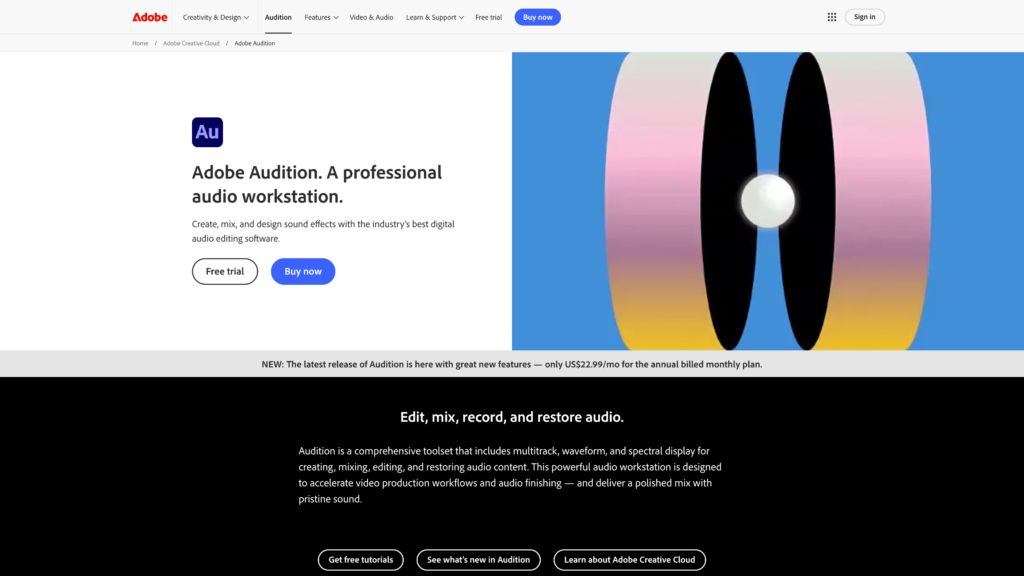
Adobe Audition is a professional-grade audio editing suite used by filmmakers, sound designers, and broadcast producers. For podcasting, it’s overkill unless you truly want to polish every soundbite or your team already uses Adobe tools like Premiere, After Effects, or Photoshop.
What most don’t know: Audition comes with advanced sound restoration tools like DeReverb, DeNoise, and spectral editing, ideal for fixing poor audio from less-than-perfect recording environments (like your startup’s co-working space or noisy home office).
Downside: High learning curve. Not beginner-friendly. If you don’t already use Adobe tools, the ROI might be low in the early days.
4.Zencastr Pro – $20/month
This is great for founders recording remote interviews with multiple guests.
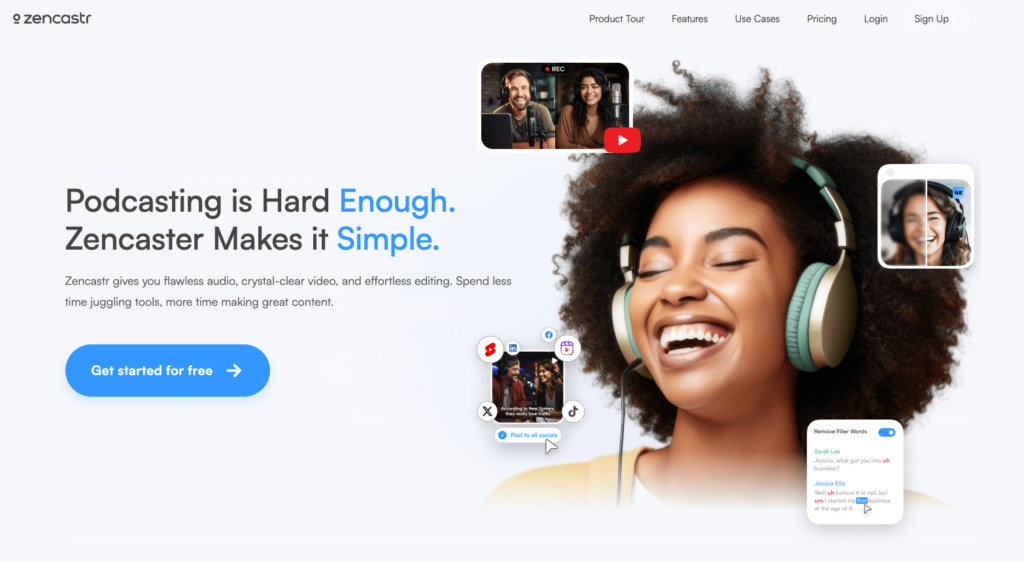
Zencastr started as an audio-only remote recording platform but now offers HD video recording too. It records locally on each guest’s computer, then uploads lossless files to the cloud, eliminating lag or distortion from poor internet connections.
What makes it worth paying for:
- Automatic post-production (volume leveling, noise reduction)
- Separate tracks for each participant
- Built-in podcast hosting and monetization options (which could reduce additional SaaS costs)
Caution: Zencastr has had reliability issues in the past (sync delays, upload errors). It’s improved, but still worth testing before a big guest episode.
5.SquadCast- $24/month
This is best for founders prioritizing crystal-clear remote interviews
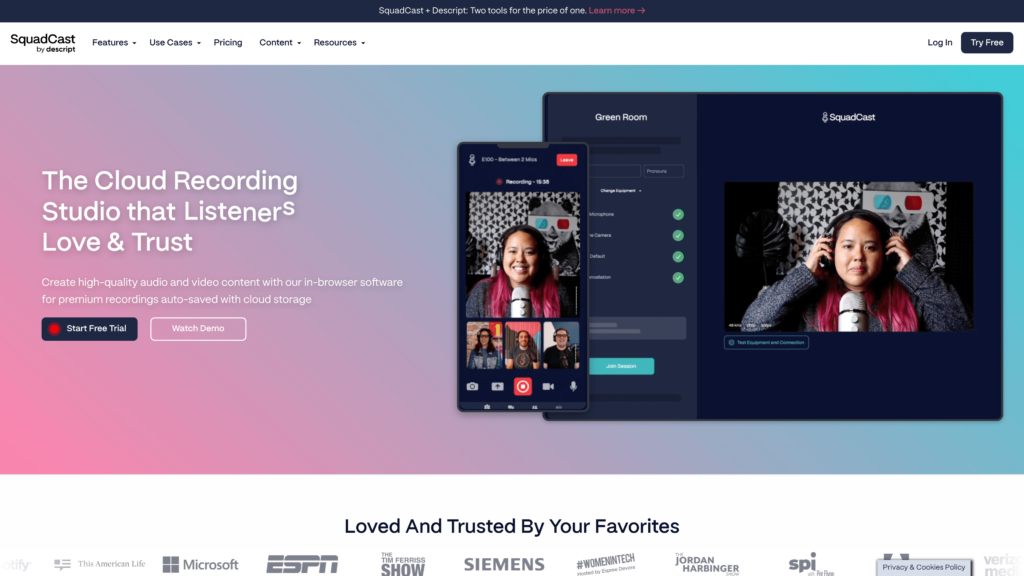
SquadCast was built specifically for podcasters and content creators. Unlike Zoom or Teams, it uses progressive upload, each participant’s audio is recorded locally and uploaded in the background during the session, resulting in studio-quality files.
Bonus insights:
- You get audio backups in case of connection drops
- Built-in video allows for repurposing content on YouTube or TikTok
- Integrates directly with Descript for seamless editing
Good to know: While the UI is slick, there’s no built-in editing tool; you’ll still need to export files to Descript or another editor.
6.Riverside.fm – $29/month
This is ideal for founders running professional interviews, panels, or co-hosted shows
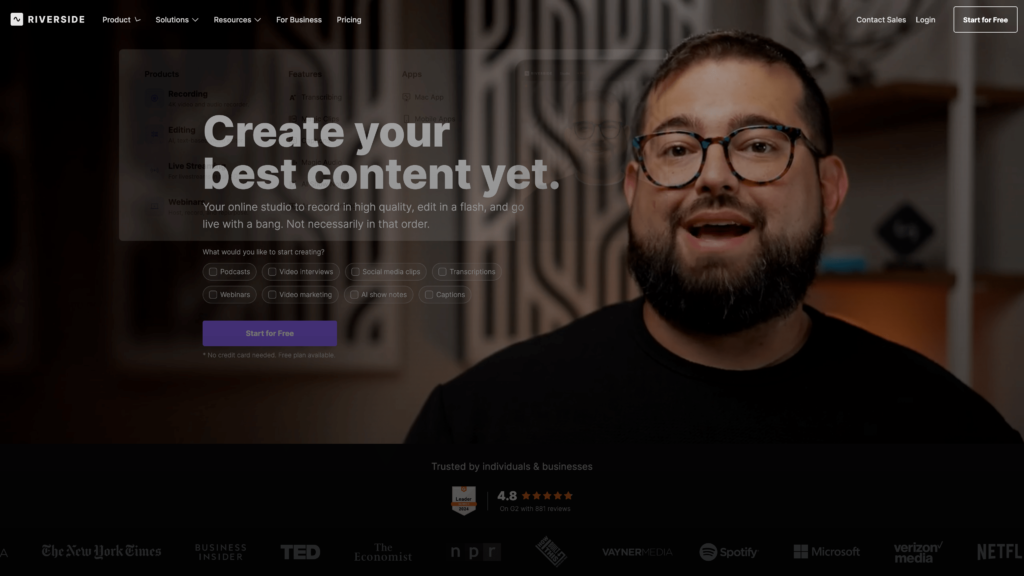
Riverside has become the go-to for video podcasters, and for good reason. It records separate audio and 4K video tracks locally, giving you studio-quality files even if your internet lags.
Where Riverside wins:
- Auto-Clipping with AI Speaker View: Riverside can automatically detect who’s speaking and turn the most engaging parts of your interview into short, punchy video clips, perfect for LinkedIn, Instagram, or TikTok. No need to hire an editor or spend hours rewatching footage.
- Instant Transcripts & Simple Edits (Magic Editor): Once your recording is done, Riverside gives you a full transcript. You can edit the episode by deleting text from the transcript, just like editing a Word doc, and the audio/video updates instantly. This is perfect if you want to clean up “ums,” pauses, or awkward moments without learning audio software.
- Producer Mode for Team Help: If you’ve got a VA, content manager, or team member, they can join the recording in the background to handle technical stuff, like muting noisy guests, checking camera quality, or helping someone troubleshoot. You can stay focused on the conversation.
Tip for founders: This tool is a smart investment if you’re planning to launch a media-heavy brand or want your content to live across multiple platforms (LinkedIn, YouTube, TikTok).
7.Descript Pro – $30/month
This is best for busy founders who want to edit like they’re working in Google Docs
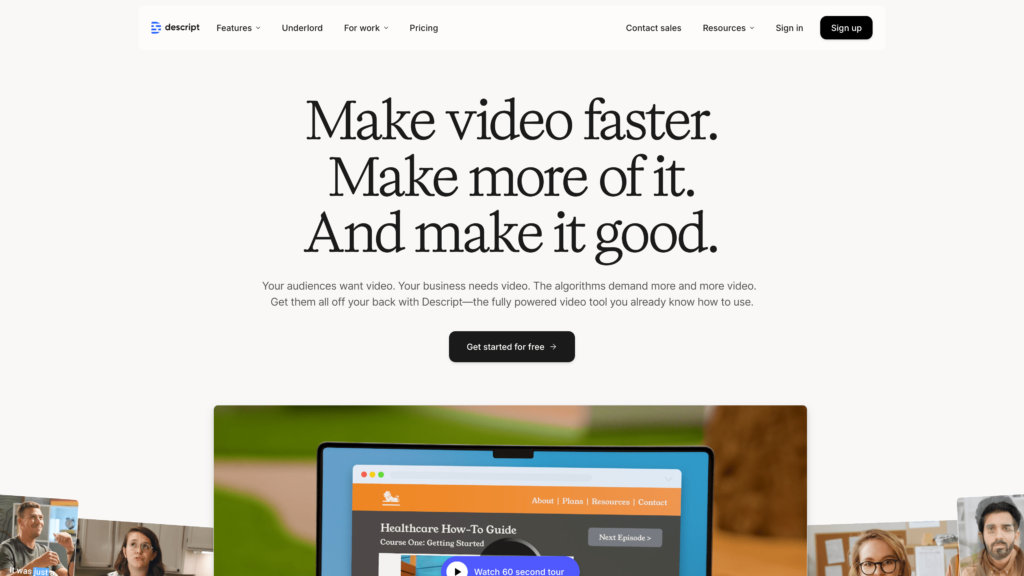
Descript has changed the podcasting game. Once your episode is recorded (or uploaded), it automatically transcribes the audio. You edit by deleting words or phrases from the transcript, and it edits the audio at the same time.
Why this matters for founders:
- You can easily remove “ums,” filler words, or long pauses
- Create audiograms and video clips without using a video editor
- Collaborate with your team asynchronously (just like a Google Doc)
Extra value: Descript also has screen recording and video editing features, which means you can use it to create pitch videos, demo walkthroughs, or onboarding content, all from one tool.
8.Alitu – $38/month (billed annually)
Designed for simplicity. It is ideal for founders who want to automate editing and focus on publishing
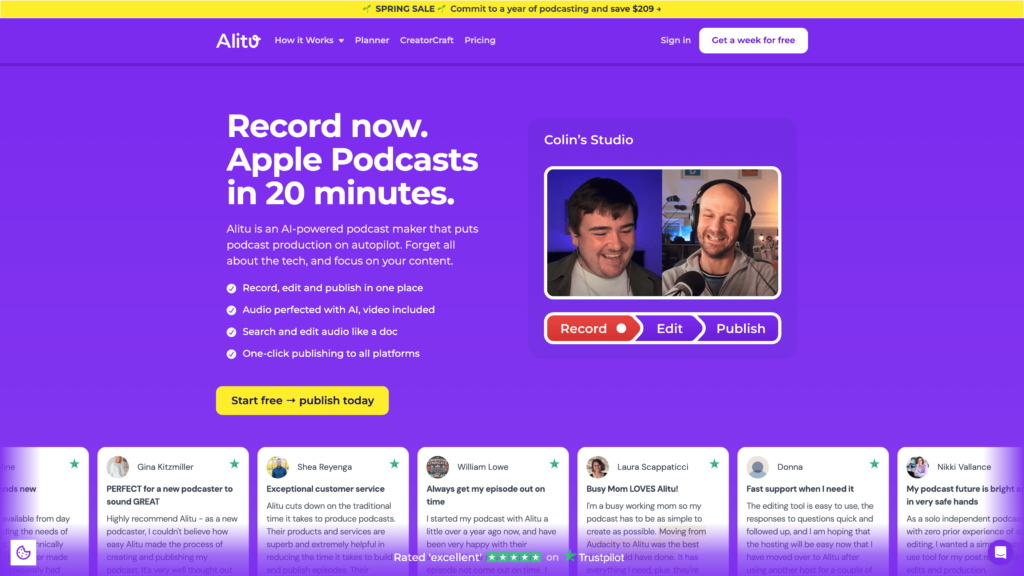
Alitu is like the podcasting equivalent of Squarespace: easy, visual, and built for speed. It handles the entire post-production pipeline, cleans audio, adds intro/outro music, and publishes your episode to podcast hosts like Buzzsprout or Anchor.
Why it saves time:
- Built-in recording and editing, no software installs needed
- Perfect if you have zero editing experience but still want quality control
- Includes hosting in the plan, no need for separate podcast distribution tools
What Alitu doesn’t tell you up front:
- No local recording = lower quality for remote guests compared to Riverside or SquadCast
- Limited creative control; great for speed, less so for nuance
Table of comparison
| Tool | Price (Monthly) | Remote Recording | Auto Editing | Hosting | Best Use Case |
| Audacity | Free | No | No | No | Bootstrapping solo founders |
| GarageBand | Free (Mac only) | No | No | No | Solo creators in Apple ecosystem |
| Adobe Audition | $22.99 | No | Limited | No | Audio professionals |
| Zencastr Pro | $20 | Yes | Yes | Yes | Interview-heavy podcasts |
| SquadCast | $24 | Yes | Yes | No | High-quality remote recordings |
| Riverside.fm | $29 | Yes (4K video) | Yes | Yes | Video podcasts and brand content |
| Descript Pro | $30 | Yes (upload) | Yes | Yes | Fast production and content repurposing |
| Alitu | $38 | No | Yes | Yes | Founders prioritizing simplicity |
To Wrap it up: Founders Should Choose Based on Stage
Choosing a podcast software isn’t about what is the trendiest. Every startup tool decision should match the company’s stage, the founder’s time, and the resources available.
Here’s how to think about it:
Early stage or MVP mode: Stick with Audacity or GarageBand. Test your format. Build consistency.
Remote guests and growing traction: Zencastr or SquadCast helps with quality interviews that don’t burn hours editing.
Time-strapped, need speed: Descript or Alitu will reduce your editing time dramatically.
Building a media brand: Use Riverside to capture high-quality video content, then edit and repurpose via Descript.
Podcasting can be your startup’s unfair advantage if you make the right choices early. Focus on clarity, efficiency, and tools that actually save you time. You’ve got a business to build.

